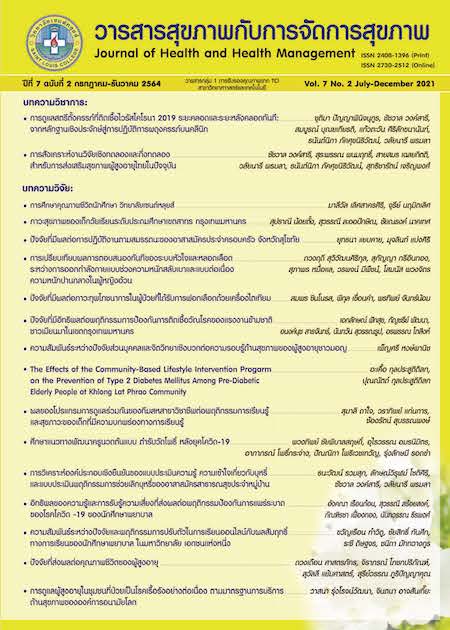The Influence of Knowledge and Risk Perception on Preventive Behaviour regarding COVID-19 Outbreak among Nursing Students
Keywords:
knowledge, risk perceptions, preventive behaviours COVID-19Abstract
This predictive research study aimed to study the influence of knowledge and risk perceptions on preventive behaviours of coronavirus 2019 (COVID-19) outbreak among nursing students at Boromarajonani College of Nursing, Buddhachinaraj. Participants were 466 nursing students. The research instrument consisted of a test of knowledge about COVID-19 as well as a questionnaire of risk perception and preventive behaviour regarding COVID-19 outbreak. The content validity of the test was verified IOC between .67 and 1.00. Reliability of the questionnaire was tested using KR-20 equal to 0.46. In addition the questionnaire about risk perceptions and preventive behaviour regarding COVID-19 outbreak were examined using a Cronbach’s reliability coefficient alpha equal to .926 and .867, respectively. Data were analyzed by frequency, percentage, mean, standard deviation, Pearson’s product moment correlation, and Stepwise multiple regression.
The results showed that most of the students had a high level of knowledge about COVID-19 (59.84%); the sum of the risk perception and preventive behaviour was at the highest level (76.40%, 65.00% respectively). Knowledge was correlated with the preventive behaviours (r = .13), and risk perception was also correlated with the preventive behaviours (r = .42). The risk perception could predict preventive behaviours at 17.90% at a statistically significant level. This results of this can be employed as a guideline for educative administrators and faculty to enhance preventive behaviours regarding COVID-19 among nursing students in the future.
References
กรมควบคุมโรค กระทรวงสาธารณสุข. (2564). การป้องกันใช้หลัก D-M-H-T-T-A. สืบค้นจาก https://ddc.moph.go.th/brc/news.php?news=16715&deptcode=brc
กรมควบคุมโรคติดต่อ กระทรวงสาธารณสุข, (2564). แนวทางการเฝ้าระวัง ป้องกัน และควบคุมโรคติดเชื้อไวรัสโคโรนา 2019 สำหรับบุคลากรทางการแพทย์และสาธารณสุข. สืบค้นจาก https://ddc.moph.go.th/uploads/publish/1150920210610033910.pdf
กรมควบคุมโรคติดต่อ กระทรวงสาธารณสุข. (2564). โรคติดเชื้อไวรัสโคโรนา 2019 (COVID-19). สืบค้นจาก https://ddc.moph.go.th/viralpneumonia/ind_world.php
บุญใจ ศรีสถิตย์นรากูร. (2553). ระเบียบวิธีการวิจัยทางการพยาบาลศาสตร์ (พิมพ์ครั้งที่ 5). กรุงเทพฯ: ยูแอนด์ไอ อินเตอร์มีเดีย.
วิทยาลัยพยาบาลบรมราชชนนี พุทธชินราช. (2564). ประกาศ เรื่อง แนวทางการปฏิบัติตนในสถานการณ์การแพร่ระบาดของโรคติดเชื้อไวรัสโคโรน่า 2019 (COVID-19) สำหรับนักศึกษา ฉบับที่ 44/2564 . เอกสารอัดสำเนา.
รังสฤษฎ์ แวดือราแม, ระวิ แก้วสุกใส, พรทิวา คงคุณ, อัชฌา สุวรรณกาญจน์ และกรรณภา ไชยประสิทธิ์. (2564). ความสัมพันธ์ระหว่างความรู้ และการรับรู้กับพฤติกรรมการดำเนินชีวิตแบบวิถีใหม่เพื่อการป้องกันโรคติดเชื้อโคโรนา 2019 ของนักศึกษาพยาบาล คณะพยาบาลศาสตร์ มหาวิทยาลัยนราธิวาสราชนครินทร์. วารสารเครือข่ายวิทยาลัยพยาบาลและการสาธารณสุขภาคใต้, 8(2), 80-92.
Albaqawi, H. M., Alquwez, N., Balay-Odao, E., Bajet, J. B., Alabdulaziz, H., Alsolami, F., ... & Cruz, J. P. (2020). Nursing students' perceptions, knowledge, and preventive behaviors toward COVID-19: A Multi-university study. Frontiers in Public Health, 8,1-9. doi.org/10.3389/fpubh.2020.57339
Bailey, S. C., Serper, M., Opsasnick, L., Persell, S. D., O’Conor, R., Curtis, L. M., ... & Wolf, M. S. (2020). Changes in COVID-19 knowledge, beliefs, behaviors, and preparedness among high-risk adults from the onset to the acceleration phase of the US outbreak. Journal of General Internal Medicine, 35(11), 3285-3292.
Best,W. J. (1978). Research in Education (3rd ed.). New Jersey: Prentice Hall.
Champion, V.L. & Skinner, C.S. (2015). In Glanz, K., Rimmer, B.K., Viswanath, K. (Eds). Health behavior and health education: Theory, research, and practice (5th ed.). San Francisco: Jossey-Bass.
Ferrer, R. & Klein, W.M. (2015). Risk perceptions and health behavior. Current Opinion Psychology, 1(5), 85-89.
Girma, S., Agenagnew, L., Beressa, G., Tesfaye, Y., & Alenko, A. (2020). Risk perception and precautionary health behavior toward COVID-19 among health professionals working in selected public university hos pitals in Ethiopia. PLOS ONE, 15(10), 1-9.
LaMorte, W.W. (2019). Behavioral change model :The health belief model. Retrieved from https://sphweb.bumc.bu.edu/otlt/mph-modules/sb/behavioralchangetheories/
Mustafa, R. M., Alrabadi, N. N., Alshali, R. Z., Khader, Y. S., & Ahmad, D. M. (2020). Knowledge, attitude, behavior, and stress related to COVID-19 among undergraduate health care students in Jordan. European Journal of Dentistry, 14(1), 50-55.
Omir, A. (2014). Sample size estimation and sampling techniques for selecting a representative sample. Journal of Health Specialties, 2(4), 142-146.
Tsai, F. J., Hu, Y. J., Chen, C. Y., Tseng, C. C., Yeh, G. L., & Cheng, J. F. (2021). Using the health belief model to explore nursing students’ relationships between COVID-19 knowledge, health beliefs, cues to action, self-efficacy, and behavioral intention: A cross-sectional survey study. Medicine, 100(11), 1-6.
Uribe, F. A. R., Godinho, R. C.S., Machado, M. A. A., Oliverira, S. G., Espejo, C. A. N., Sousa, N.C.V., … Pedroso, J.S. (2021). Health knowledge, health behaviors and attitudes during pandemic emergencies: A systematic review. PLoS ONE, 16(9), 1-14.
World Health Organization. [WHO]. (2021, October 28). Coronavirus disease (COVID-19). WHO Thailand Weekly. Retrieved from: https://reliefweb.int/sites/reliefweb.int/files/resources/2021_10_28_eng-sitrep-207-covid19.pdf
Downloads
Published
How to Cite
Issue
Section
License
Copyright (c) 2021 Journal of health and health management

This work is licensed under a Creative Commons Attribution-NonCommercial-NoDerivatives 4.0 International License.




